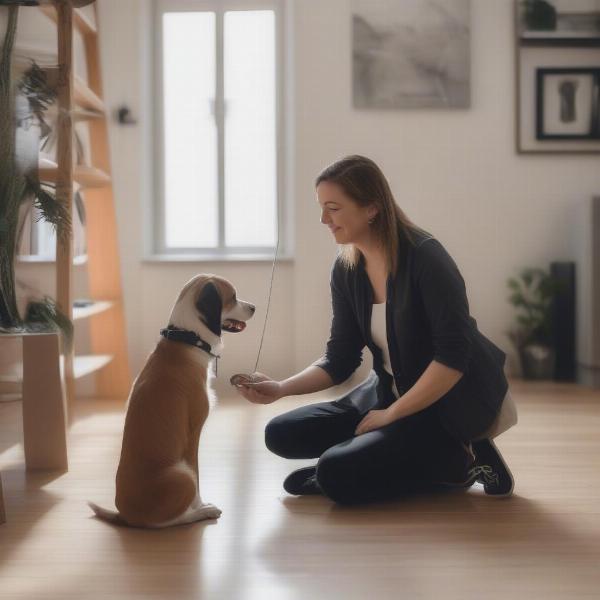Aggression in dogs can be a serious concern for owners. Whether it’s directed towards other dogs, people, or even objects, aggressive behavior needs to be addressed professionally. Finding the right dog trainer for aggression is crucial for effectively modifying these behaviors and ensuring the safety and well-being of your dog and those around them. This article will guide you through the process of selecting a qualified and experienced dog trainer who specializes in aggression.
Understanding Canine Aggression
Before searching for a dog trainer, it’s essential to understand the different types of canine aggression. This understanding helps you articulate your dog’s specific issues to potential trainers and ensures they have the appropriate expertise. Common types include territorial aggression, possessive aggression, fear-based aggression, and redirected aggression. Each type requires a tailored training approach. For instance, a dog displaying fear-based aggression needs a different approach than a dog exhibiting possessive aggression.
Key Qualities to Look for in a Dog Trainer for Aggression
When choosing a dog trainer for aggression, certain qualifications and experience are essential. Look for certifications from reputable organizations such as the Certification Council for Professional Dog Trainers (CCPDT) or the International Association of Animal Behavior Consultants (IAABC). These certifications indicate a commitment to ongoing education and adherence to ethical training practices. Experience specifically with aggression cases is also crucial. Ask potential trainers about their experience with similar cases to your dog’s.
Evaluating Training Methods
Avoid trainers who rely solely on punishment-based methods. Positive reinforcement techniques, which involve rewarding desired behaviors, are far more effective and humane. Ask potential trainers about their training philosophy and ensure they prioritize positive reinforcement and avoid outdated dominance-based methods. A good trainer will focus on building a positive relationship between you and your dog.
Asking the Right Questions
Prepare a list of questions to ask potential dog trainers. These questions might include their training methods, experience with similar cases, success rate, and how they handle setbacks. Don’t hesitate to ask for references and follow up with previous clients. A transparent and communicative trainer is a good sign.
The Consultation Process
Most reputable trainers offer an initial consultation. This is a valuable opportunity to meet the trainer, discuss your dog’s behavior, and observe their interaction with your dog. Pay attention to how the trainer communicates with both you and your dog. Do they create a sense of trust and understanding?
 Consultation for dog aggression training
Consultation for dog aggression training
What to Expect During Training
Once you’ve selected a trainer, understand that behavior modification takes time and consistency. Be prepared to actively participate in the training process and follow the trainer’s guidance at home. The trainer should provide you with a clear training plan and ongoing support.
Conclusion
Finding the right dog trainer for aggression is a crucial step towards resolving your dog’s behavioral issues. By prioritizing qualifications, positive reinforcement methods, and open communication, you can ensure your dog receives the best possible care and guidance. A well-trained dog is a happier and safer dog.
FAQ
- How much does a dog trainer for aggression typically cost? Costs vary depending on location and the trainer’s experience, but expect to invest in a qualified professional.
- How long does it take to see results with aggression training? Progress varies depending on the dog and the severity of the aggression, but consistency is key for long-term success.
- What if my dog bites someone during training? A qualified trainer should have procedures in place to manage such incidents and prioritize safety. Discuss this during the consultation.
- Can all types of aggression be treated with training? In most cases, training can significantly improve aggressive behavior. However, some severe cases may require additional intervention.
- How do I know if a trainer is using positive reinforcement methods? Ask about their training philosophy and observe their interactions with your dog during the consultation. They should focus on rewarding desired behaviors, not punishing unwanted ones.
- What should I do if I’m not seeing progress with my current trainer? Open communication is key. Discuss your concerns with the trainer and consider seeking a second opinion if necessary.
- How can I find a dog trainer specializing in aggression in my area? Online directories, veterinary referrals, and local dog groups are good resources.
dog aggression trainer
can raw meat make a dog aggressive
dog training wollongong
dog toy barking
About ILM Dog
ILM Dog is your global resource for expert dog care and training advice. We cover a wide range of topics, from breed selection and puppy care to senior dog health and behavior modification. Our team of experienced writers and dog professionals are dedicated to providing practical, reliable information to help you give your dog the best possible life. For all your dog-related needs, from choosing the right breed to tackling behavioral issues, ILM Dog provides the knowledge and support you need. Contact us at [email protected] or +44 20-3965-8624.